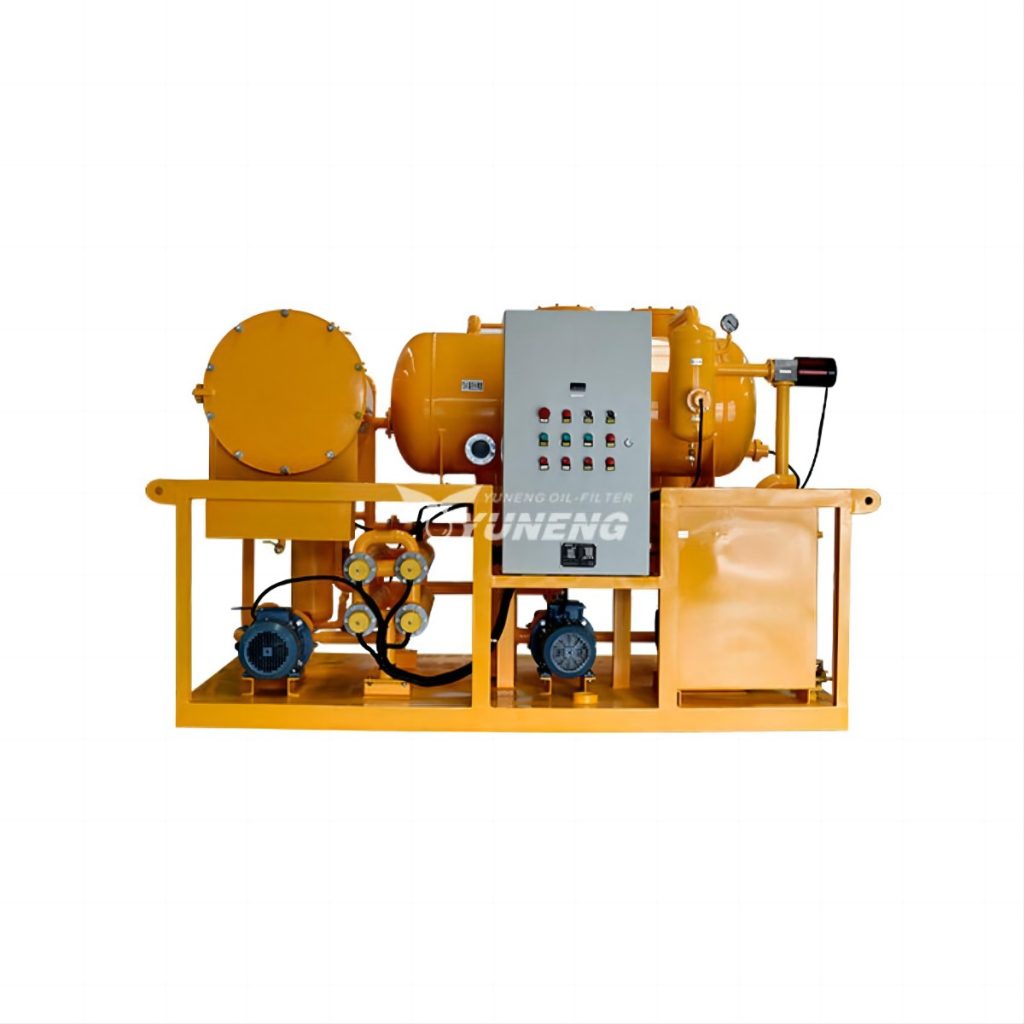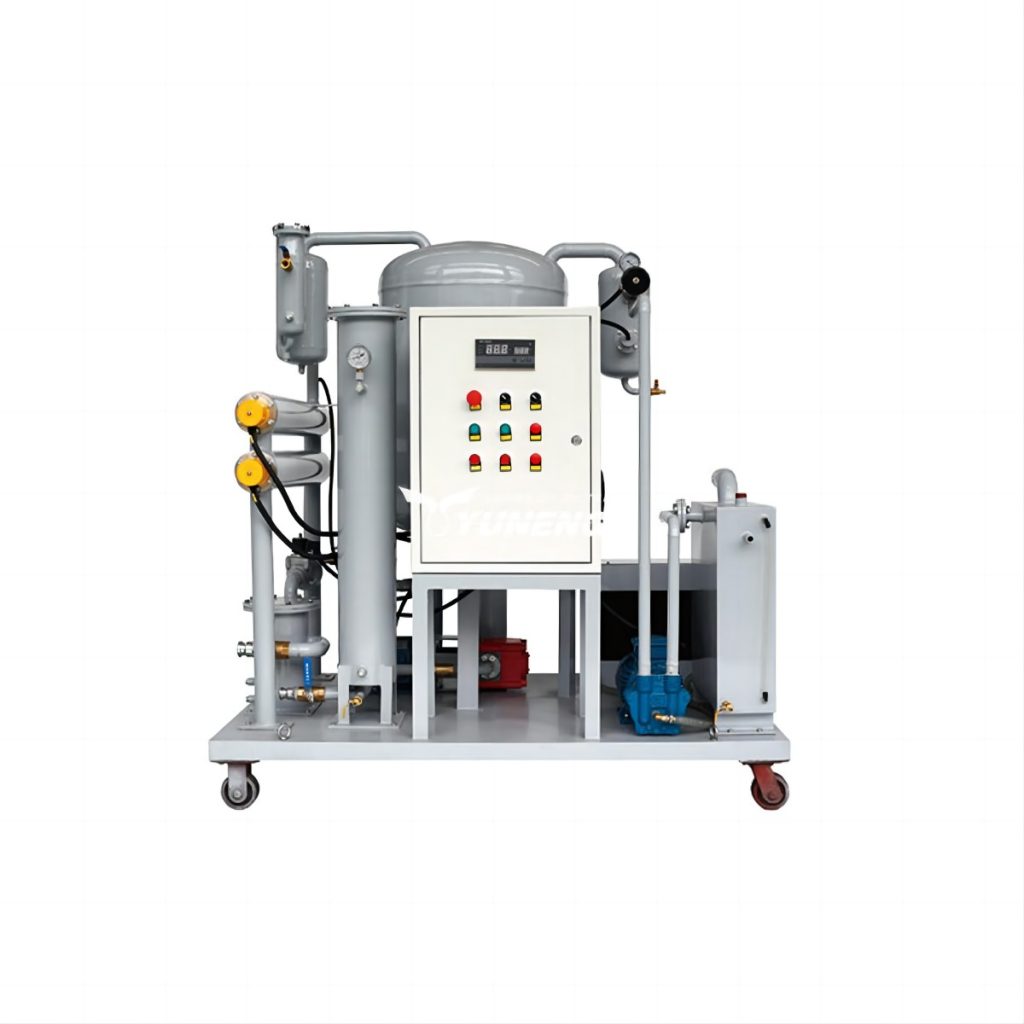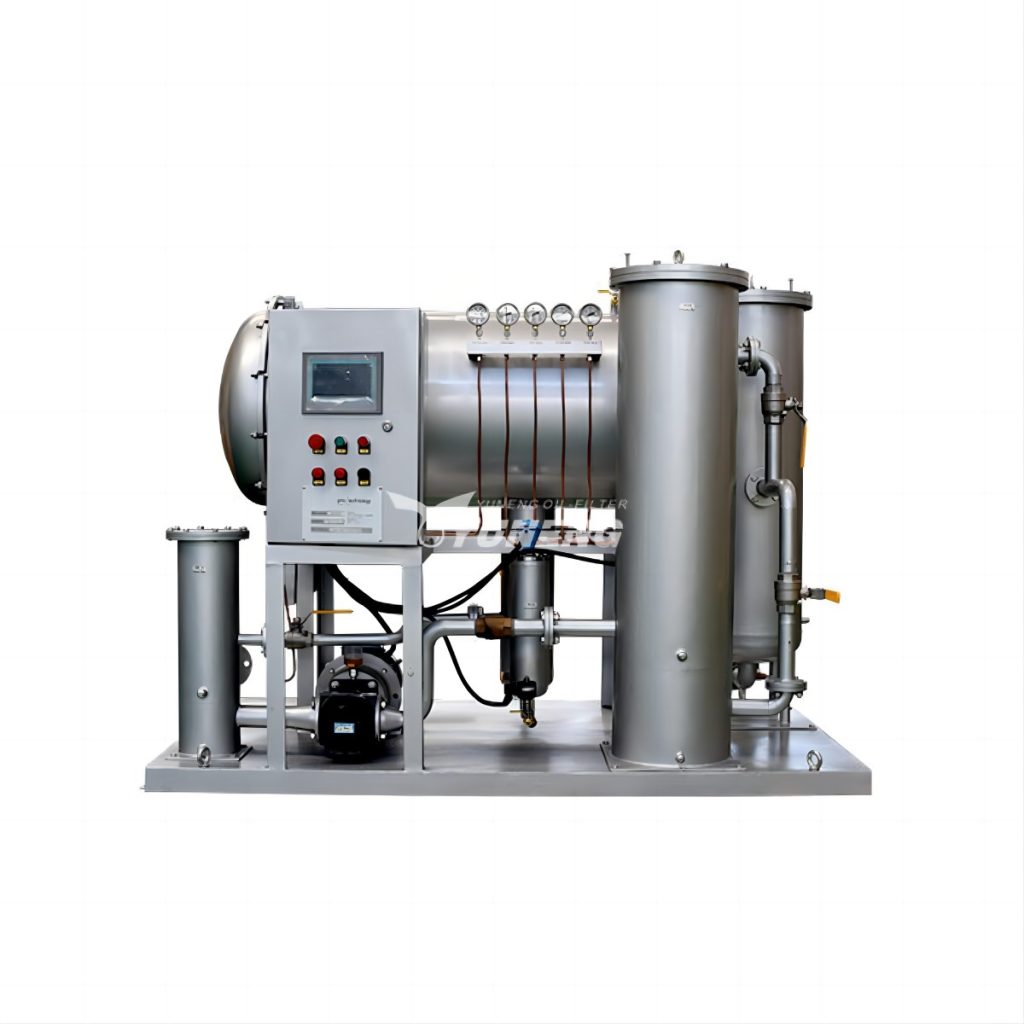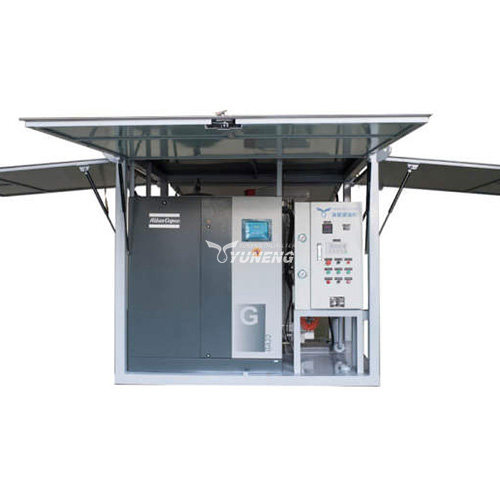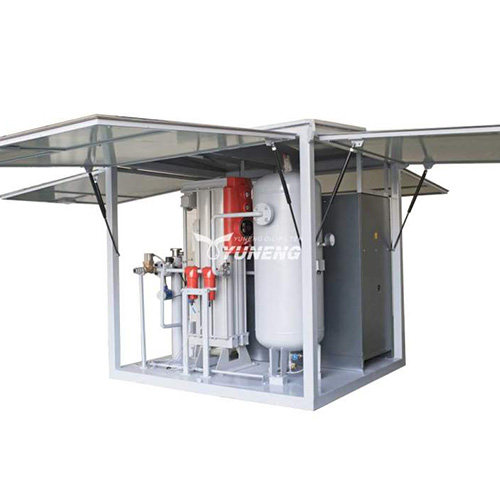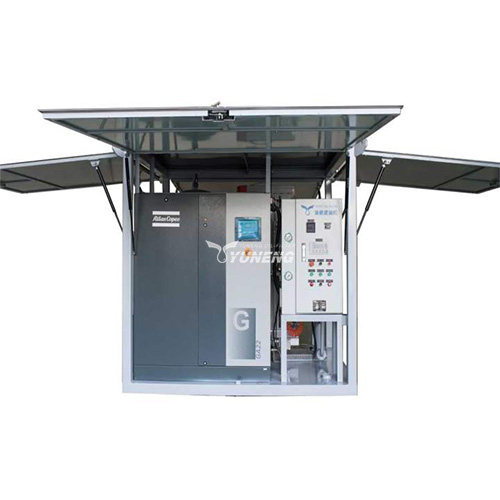Turbine Oil Purifier: Principle, Application, and How to Choose
Turbine oil purifier is a filtration device widely used in various industries such as power, aviation, and chemical industry, used to remove solid impurities and moisture from oil. They play a crucial role in maintaining the cleanliness of lubricating oil and fuel, thereby ensuring smooth operation of the machine and extending its service life. This article delves into the working principles, applications, and performance factors to consider when selecting a turbine oil purifier.
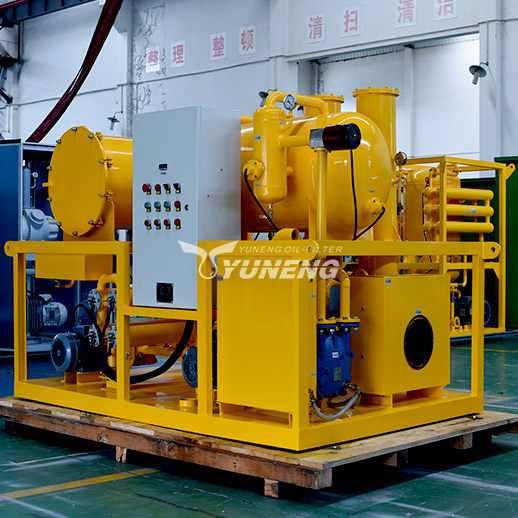
Working Principle of Turbine Oil Purifiers
The magic behind a turbine oil purifier lies in its multi-stage filtration process, meticulously designed to remove contaminants and ensure oil cleanliness. Let’s delve deeper into the core components and how they work together:
1. Pre-filtration:
Primary Filter: This acts as the first line of defense, typically a coarse filter element that captures larger particles like dirt, debris, and metal shavings. This protects the finer filtration stages from clogging prematurely and extends their lifespan.
2. Oil Pump:
The heart of the system, the oil pump is responsible for drawing in the contaminated oil. It creates a pressurized flow, propelling the oil through the filtration stages.
3. Filtration System:
This is where the real separation magic happens. Here, the oil encounters various filtration techniques, each targeting specific contaminants:
- Physical Filtration: Here, the oil passes through meticulously chosen filter media, such as filter paper or micron-rated mesh filters. These media have precisely sized pores that trap solid impurities like dust, wear particles, and other debris based on their size. This method offers a simple and effective way to remove larger contaminants.
- Vacuum Dehydration: This technique tackles the nemesis of lubrication – water. A vacuum pump creates a low-pressure environment within the system. This pressure reduction lowers the boiling point of water present in the oil, causing it to evaporate at room temperature. The vapor then travels through a condenser, where it cools and transforms back into liquid water. This condensate is collected and separated from the oil, effectively removing moisture.
- Centrifugal Separation: This method leverages the power of centrifugal force. The oil enters a rapidly spinning rotor within the filtration system. The centrifugal force generated flings denser contaminants, such as heavy metal particles and sedimentation, outwards towards the wall of the rotor. These contaminants are then collected and removed from the system, resulting in exceptionally clean oil.
4. Clean Oil Return:
Once the oil has successfully navigated through all the filtration stages, it’s free of impurities and ready to return to service.
- Gravity-based Return: In some purifier designs, the clean oil simply flows back to the storage tank due to gravity.
- Pump-assisted Return: Other designs may utilize a separate pump to ensure efficient transfer of the purified oil back to the reservoir.
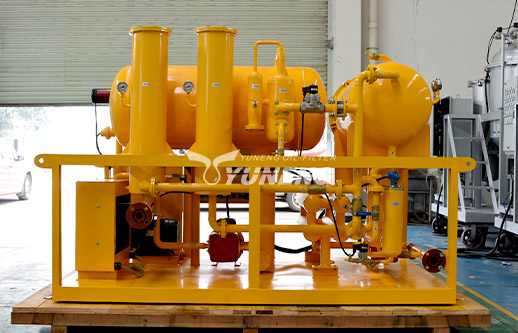
Application of Turbine Oil Purifier
The turbine oil purifier is an indispensable part of the smooth operation of machinery in various industries, ensuring the cleanliness and service life of the turbine oil. Here are some detailed examples of its application:
1. Power industry: In power plants, the main function of turbine oil purifiers is to maintain the cleanliness of generator lubricating oil and fuel. Impurities in oil can cause corrosion and wear of generator components, reducing their efficiency and service life. The turbine oil purifier can remove these impurities, ensuring smooth and efficient operation of the generator. In addition, they also help reduce maintenance costs and downtime related to generator maintenance.
2. Aviation industry: In the aviation industry, turbine oil purifiers are crucial for filtering lubricating oil and fuel from aircraft engines. High altitude flight can expose the engine to extreme temperatures and pressures, so maintaining the cleanliness of the engine oil is crucial. The turbine oil purifier ensures that the oil is free of pollutants, thereby ensuring the reliability of aircraft engines during flight. They also help reduce engine wear and prolong its service life.
3. Chemical industry: In chemical production, turbine oil purifiers are used to filter various chemical reaction media. The purity of a chemical is crucial for the success of the reaction and the quality of the final product. The turbine oil purifier ensures that chemical substances remain pure and free of pollutants, thereby maintaining the accuracy of the reaction and the quality of the final product. They also help prevent any unnecessary side reactions that may occur due to impurities in the chemicals.
4. Metallurgical industry: In metallurgy, turbine oil purifiers are used to filter lubricating oil and fuel from metal processing machinery. The quality of these oils is crucial for the smooth operation of the machine and the quality of the metal produced. The turbine oil purifier ensures that the oil is free of pollutants, thereby improving the efficiency and productivity of metal processing machinery. They also help reduce the wear of machine components and extend their service life.
5. Shipbuilding industry: In the shipbuilding industry, turbine oil purifiers are used to filter lubricating oil and fuel from marine engines. The harsh marine environment can expose the engine to salt water and other corrosive elements, so maintaining the cleanliness of the oil is crucial. The turbine oil purifier ensures that the oil is free of pollutants, thereby ensuring the reliability of marine engines during long-distance voyages. They also help reduce engine wear and prolong its service life.
6. Automotive industry: In the automotive industry, turbine oil purifiers are used to filter lubricating oil and fuel from automotive engines. The quality of these oils is crucial for the performance and durability of the engine. The turbocharger oil purifier ensures that the oil is free of pollutants, thereby improving engine performance and extending its service life. They also help reduce engine wear and reduce oil change frequency.
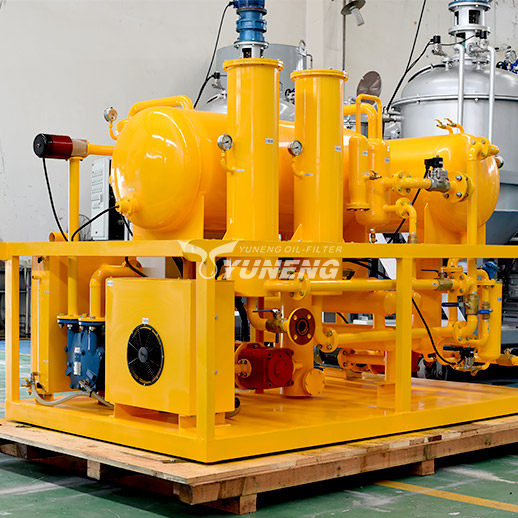
Factors to Consider When Selecting a Turbine Oil Purifier
When choosing a turbine oil filter, several performance factors must be considered, including:
- Flow rate: Flow rate represents the amount of oil that can be processed per unit time. Different application scenarios have different traffic requirements. For example, large industrial equipment may require higher flow rates to meet the demand for continuous operation. The flow rate usually depends on the size and speed of the turbine, as well as the viscosity of the oil.
- Work pressure: Work pressure represents the maximum pressure difference that the turbine oil filter can withstand, which determines its ability to operate stably under various pressures. In general, the working pressure should exceed the working pressure of the system to ensure that the oil circuit passes through the filter smoothly.
- Cleanliness level: Cleanliness level refers to the filtration efficiency achieved by the turbine oil filter, representing the maximum allowable diameter of particles in the oil. Cleanliness directly affects oil performance and equipment safety. According to the national standard GB/T 14039 and other international standards, the cleanliness of oil products can be measured using the extinction method (shading method).
- Temperature resistance: Temperature resistance refers to the temperature range within which a turbine oil filter can operate without being affected by temperature fluctuations. The temperature resistance range of different types of turbine oil filters varies and needs to be selected based on the actual temperature conditions of the operating environment.
- Filtering accuracy: The filtering accuracy reflects the ability of the turbine oil filter to effectively remove small particles, usually measured in millimeters or micrometers. High filtration accuracy directly affects the cleanliness of the oil and the service life of the purifier.
- Brand and price: Brand is another key factor in choosing a turbine oil filter. Famous brands often provide superior performance and more comprehensive after-sales service. However, price is also an important consideration, requiring a reasonable budget while ensuring that performance requirements are met.

Conclusion
Turbine oil purifiers serve as critical equipment in various industries, including power, aviation, and chemical sectors. Proper selection and utilization of turbine oil purifiers ensure the cleanliness of lubricating and fuel oils, safeguarding equipment operation and extending its lifespan. When selecting a turbine oil purifier, a comprehensive evaluation of performance factors and appropriate configuration based on specific application scenarios are essential.

